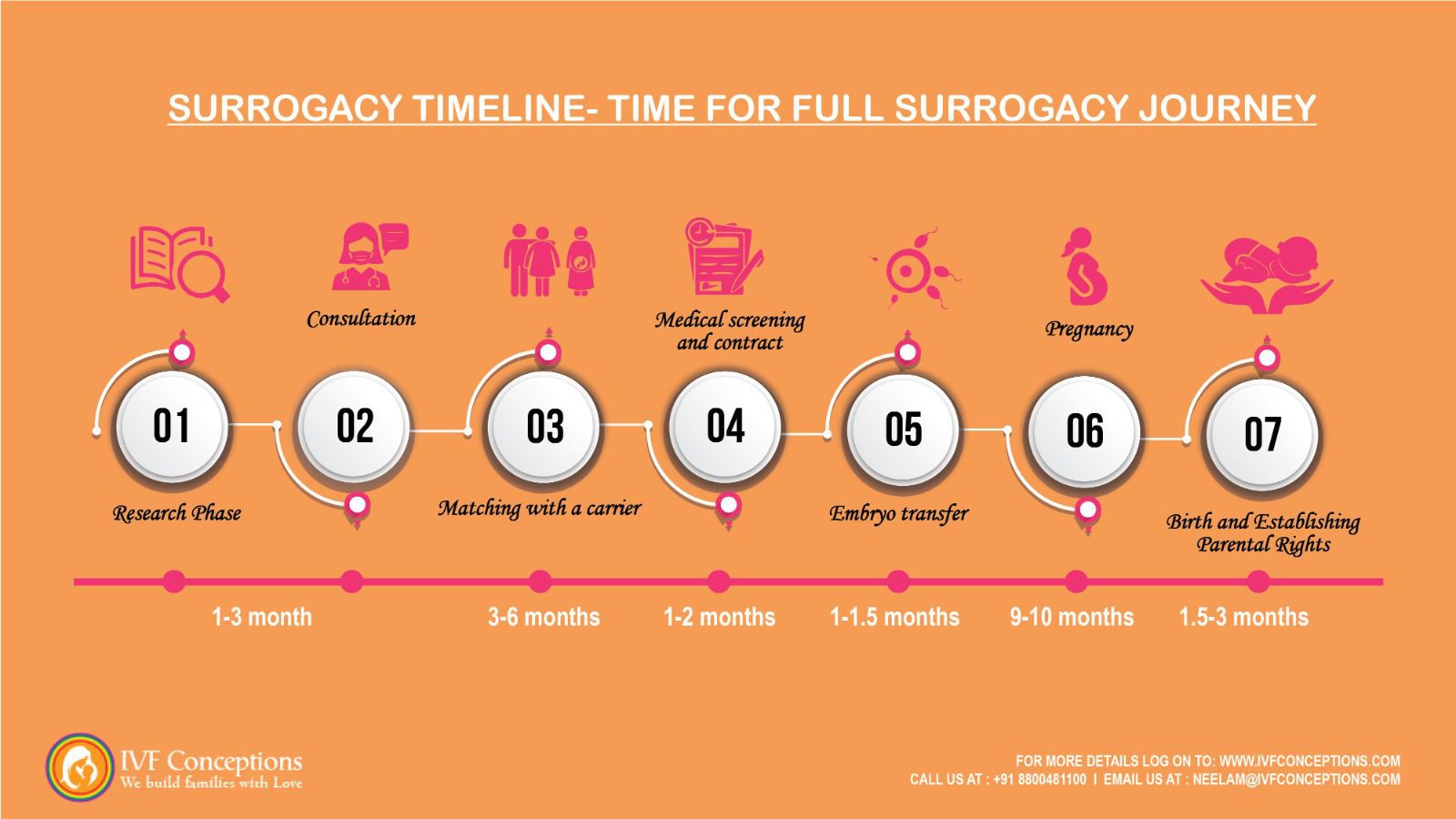How Long It Takes To Get Pregnant: Tips for Faster Conception

Most intended parents will get pregnant within a year if they have regular sex without using contraceptives. Are you on the exciting journey of trying to conceive? Whether you’re just starting to think about it or have been on this path for a while, the anticipation and questions can be overwhelming. We’re here to provide you with expert guidance on how to increase your odds of getting pregnant and what factors can impact your journey.
In a world where infertility is affecting one out of 8 couples in the world, being pregnant is bliss for a childless couple. Pregnancy not only brings joy and happiness but also a sense of responsibility for raising a child. See your doctor and visit the Pregnancy and Children’s Clinic as soon as you suspect you are pregnant.
 How much time does it take to get pregnant?
How much time does it take to get pregnant?
The Timeline of Conception
Getting pregnant is a unique experience for each individual, and various factors come into play when considering the time it takes to conceive. While it’s true that approximately 80% of couples trying to conceive will successfully achieve pregnancy within six months, it’s important to note that age and other factors play a significant role.
In some cases, couples get pregnant easily in a time period of six months or a year, in other cases, it may take more than one year to get pregnant. Also, some couples get pregnant naturally while some do not get pregnant naturally. That purely depends on the couples and various other factors related to them like –
- The age of the couple
- The reproductive health of the couple
- The regular physical and mental health of the couple
- How often do you have sex with your partner?
Fertility Statistics
Fertility refers to the ability to bear a child. According to the report around 84 out of 100 couples will turn out to be pregnant within one year of regular and unprotected sex. But in a few cases, where a woman has passed the bearing age, it is almost impossible for her to be fertile. Also, as the woman ages, she becomes less fertile.
One study found that unprotected sex leads to pregnancy as below:
- Around 19 and 26 years of age – after one year, 92% and after two years 98% conceive
- 35-39 years of age – after 1 year, 82%, and after 2 years, 90% conceive.
Factors Affecting Conception
1. Age: Age is a critical factor when it comes to fertility. Fertility naturally declines with age, with those in their 20s and 30s having a higher chance of getting pregnant in any given menstrual cycle. By the age of 40, fertility significantly decreases. While pregnancy is still possible after 35, it may require more time and effort.
2. Timing: The timing of intercourse in relation to ovulation is crucial. Ovulation, when the ovary releases an egg, typically occurs in the middle of your menstrual cycle and is when you’re most fertile. Having intercourse during this fertile window increases your chances of conception.
3. Birth Control: If you’ve been using birth control methods such as condoms, pills, or IUDs, you’ll need to discontinue them to become pregnant. Some birth control methods, like the Depo-Provera® shot, can impact fertility for several months after discontinuation.
How soon you can get pregnant after having sex?
It may take up to six days after getting sperm and egg to join together and shape a fertilized embryo. Pregnancy does not start on the day you have sex. The fertilized egg may then require three to four days to fully implant in the uterus.
Pregnancy starts when the hormones required to sustain pregnancy are released during implantation. A pregnancy test is the only way to be sure of it. A home pregnancy test is available at pharmacies.
Maximizing Your Chances of Conception
At IVF Conceptions, we’re committed to helping you increase your odds of getting pregnant. Here are some steps you can take to enhance your fertility:
1. Ovulation Tracking: Understanding your menstrual cycle and tracking ovulation can be empowering. If your periods are regular, you can estimate ovulation about 14 days after your last period. Having intercourse leading up to and during ovulation is recommended.
2. Stress Management: High-stress levels can affect fertility. Finding ways to manage stress, such as through relaxation techniques or counseling, can be beneficial.
3. Regular Exercise: Staying physically active contributes to overall health and can positively impact fertility. Aim for regular, moderate exercise to support your reproductive system.
4. Healthy Diet: A well-balanced diet rich in nutrients can improve fertility. Incorporate a variety of fruits, vegetables, whole grains, lean proteins, and healthy fats into your meals.
5. Maintaining a Healthy Weight: Achieving and maintaining a healthy weight is essential for fertility. Both underweight and overweight individuals may face challenges in conceiving.
6. Lifestyle Changes: Quitting smoking and limiting caffeine intake can improve your chances of getting pregnant. Additionally, for your partner, practicing “saving up” sperm for ovulation can be beneficial.
 Symptoms of Pregnancy
Symptoms of Pregnancy
- Spots and Cramps – The fertilized egg sticks to the base of the cervix. This can cause one of the earliest symptoms of pregnancy – spots and sometimes cramps. This is called bleeding implantation. It happens everywhere between six and 12 days after fertilization.
- Breast changes – Another early sign of pregnancy is breast changes. After fertilization, the hormone levels of a woman rapidly shift. Her breasts may swell, sore, or tingly a week or two later because of changes. Or they can feel tender to the touch.
- Nausea –Morning sickness, which is one of the classic symptoms of pregnancy at any time of day or night. The sickness of certain women starts just two weeks after conception.
- Mood swings – In early pregnancy, the surge of hormones will make you excessively emotional and cry. Mood swings, especially in the first quarter, are also common.
- Faintness – You can feel lightheaded or dizzy when your blood vessels expand and your blood pressure falls. Faintness can also be caused by low blood sugar early in pregnancy.
When do we know that a male is infertile?
In some cases of male infertility, an important element of the signs and symptoms can be the underlying problem of inherited disorder and hormonal imbalance around the testicles. Several signs of male infertility and symptoms are-
- Testicular odor, lump, or swelling
• Smelling incapacity
• Gynecomastia or unusual breast growth
• Reduced face or body hair
• Sexual function problems such as decreased sexual appetite, erectile dysfunction, or ejaculation difficulties.
Read more:
Time is taken to get pregnant in IVF
How Long Does the Surrogacy Process Take?
What do you need to know about Infertility in elderly females?
What are the causes of infertility in males and how to treat it?
Tips for Healthy Surrogate Pregnancy
When do we know that a female is infertile?
- Irregular periods – A woman whose cycles vary so much that she cannot even start estimating if irregular periods occur. This can be associated either with hormone problems or with PCOS. Both of these can make you infertile.
- Pain during sex – Some women have found it is normal to have painful sex throughout their lives. It isn’t, however. It may be linked to endometriosis or other conditions that may contribute to infertility.
- No periods – Women have a month off here and it is not unusual. Factors such as stress and intense training will momentarily cause your cycle to not occur. Yet it is time for you to have your fertility tested if you haven’t had any cycles in months.
When to Seek Specialist Guidance
If you’ve been trying to conceive without success, it’s essential to know when to seek specialized help. At IVF Conceptions, we recommend the following guidelines:
1. Age 35 and Younger: If you’re under 35 and haven’t become pregnant after trying for a year, it may be time to consult a fertility specialist.
2. Age Over 35: For those over 35, we advise seeking assistance if pregnancy hasn’t occurred within six months of trying. Fertility can decline more rapidly in your late 30s and beyond.

What is the surrogacy timeline and how does does surrogacy process take?
If you are unable to conceive yourself and you need third-party reproductive services like egg donors and surrogate mothers, it is possible.
For some ladies, using a surrogate mother is the only option left to fulfill their dream of parenthood. So, here, lets us give some detail about it:
The surrogacy process is a complex yet rewarding journey, requiring careful consideration at every step. By understanding the process, navigating legalities, and fostering positive relationships, intended parents can make an informed and confident choice.
- Preparation and Research
Before diving into the surrogacy process, thorough research and preparation are crucial. Prospective parents and surrogate mothers need to understand the legalities, costs, and emotional aspects associated with surrogacy.
- Selecting a Surrogacy Agency
Choosing a reputable surrogacy agency is a pivotal step. These agencies facilitate the matching process, provide legal guidance, and ensure a smooth journey. Evaluate agencies based on their track record, success rates, and client testimonials.
- Legal Formalities
The legal framework surrounding surrogacy varies, so it’s imperative to navigate this aspect carefully. Contracts outlining rights, responsibilities, and financial agreements between intended parents and surrogates are drafted and signed.
- Medical Evaluations and Procedures
Both the surrogate and intended parents undergo rigorous medical evaluations. Fertility treatments, including in vitro fertilization (IVF), may be employed. This phase is closely monitored by medical professionals.
- Pregnancy and Support
Once pregnant, the surrogate receives comprehensive medical care. Emotional support is vital for both the surrogate and intended parents throughout the pregnancy. Regular communication and updates help foster a positive and trusting relationship.
- Birth and Legal Proceedings
As the due date approaches, plans for the birth are finalized. The legal aspects of parental rights are addressed to ensure a seamless transition. The birth of the child is a momentous occasion for all involved.
- Post-Birth Follow-Up
After the birth, the surrogacy journey doesn’t end. Continued support and open communication between the surrogate and intended parents contribute to a healthy post-surrogacy relationship.
Conclusion
It takes time to get pregnant, particularly if age or physical problems are factors. So, if you ask how much time it takes to get pregnant, the small and simple answer is up to one year of unprotected sex till the age of 35. If you are above that, it might take longer, and might need medical assistance such as “Assisted Reproductive Technology (ART) to conceive.
How long does surrogacy take? It usually takes 15 to 18 months from the time a person begins the process to the moment the baby is born.
At IVF Conceptions, we’re dedicated to supporting you on your journey to parenthood. Our team of experts is here to provide guidance, answer your questions, and help you make informed choices about your fertility and conception.
If you’d like to learn more about IVF, Egg Donation, or surrogacy services globally, check out the rest of our website: IVF Conceptions. We offer legally secure and affordable surrogacy consulting services for FREE.
Our team has over 13 years of experience facilitating surrogacy arrangements, egg donation, and serving as an advocacy resource for infertile couples and LGBTQ individuals seeking to build families.
Our founder and chief surrogacy consultant, Neelam Chhagani, passionately helps couples struggling with fertility challenges. Since starting our surrogacy consulting agency in 2013, we’ve helped welcome over 500 babies for intended parents nationwide.
Our team includes experts from diverse backgrounds with leading reproductive attorneys, professionally trained top fertility doctors, former surrogacy case managers, experienced and kind surrogate mother and egg donor coordinators, mental health professionals specializing in infertility counseling, and a logistic support team to assist you in your chosen surrogacy country.
FAQs for How long it takes to get pregnant
- How long does it typically take to get pregnant?
Typically, 80% of people trying to conceive will succeed within six months, with 5% more getting pregnant by the end of the first year. However, the time to conceive varies for each individual.
- What factors can affect the time it takes to conceive?
Factors such as age, frequency of intercourse, and underlying health conditions can affect the time it takes to conceive. Age is a significant factor, with fertility declining after 35.
- Are there any ways to speed up the process of getting pregnant?
To increase your chances of getting pregnant faster, you can track ovulation, have sex during the ovulation window, maintain a healthy lifestyle, manage stress, exercise regularly, and follow a balanced diet.
- What should I do if I’m not getting pregnant as quickly as I expected?
If you’re not getting pregnant within a reasonable time frame, consult with a healthcare provider for guidance and evaluation. Typically, after one year of trying (or six months for those over 35), it’s advisable to seek professional advice.
- Can age impact the time it takes to conceive?
Yes, age significantly affects fertility. People in their 20s and 30s have a higher chance of becoming pregnant in any given menstrual cycle compared to those over 35. Fertility decreases with age.
- Are there any natural methods to increase fertility and conception chances?
Natural methods to boost fertility include tracking ovulation, reducing stress, regular exercise, a healthy diet, maintaining a healthy weight, quitting smoking, and limiting caffeine intake.
- What role does a healthy lifestyle play in getting pregnant faster?
A healthy lifestyle contributes to faster conception. It includes maintaining a balanced diet, staying physically active, managing stress, and avoiding harmful habits like smoking.
- Should I consult a fertility specialist if it’s taking a long time to conceive?
If you’re under 35 and haven’t conceived after a year of trying, or if you’re over 35 and haven’t conceived after six months, it’s advisable to consult a fertility specialist for evaluation and guidance.
- Are there any early signs of pregnancy to watch for during the waiting period?
Early signs of pregnancy may include missed periods, fatigue, breast tenderness, and a positive home pregnancy test.
- What are the common misconceptions about getting pregnant quickly?
One common misconception is that getting pregnant is always quick and easy. In reality, it varies among individuals, and factors like age and health play a crucial role in the time it takes to conceive.
Resources used:

 How much time does it take to get pregnant?
How much time does it take to get pregnant?
 Symptoms of Pregnancy
Symptoms of Pregnancy 

